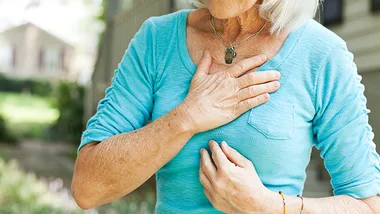It’s a time when we have a lot more than honey-glazed ham on our plates…
What with present hunting, decorating and working to the fast-approaching deadline of Christmas Day, the silly season can come as a busy time for the best of us.
But, worryingly, a new report has found women who stress to make the holidays a perfect time for others have an increased risk of serious heart problems.
Karla Kurrelmeyer, Houston Methodist DeBakey Heart & Vascular Center cardiologist, says that in their mission to ensure smooth sailing on Christmas Day, many women will neglect the mild signs and symptoms of a heart attack.
“Most of the time people who are experiencing a heart attack will have pain in the chest, shortness of breath, etc. Silent heart attack symptoms might be as simple as indigestion, flu-like symptoms, or feeling discomfort like a pulled muscle in the chest or back,” Kurrelmeyer says.
“It’s important to have these symptoms checked as soon as possible to avoid scarring or damage to the heart.”
The cardiologist explains that stress-induced cardiomyopathy is a particular concern in women during the holidays.
Women are at a particularly high risk if this stress occurs in conjunction with a recent traumatic event, such as the death of a family member, car accident or financial strain, with the health implications associated potentially fatal if ignored.
“Stress-induced cardiomyopathy is a weakening of the left ventricle, the heart’s main pumping chamber,” Kurrelmeyer says.
“It is brought on by the release of stress hormones that shock the heart, causing changes in the heart muscles that then cause the left ventricle to not work properly,” she explains, adding that women in their late 50s to mid-70s are the most affected.
A spike in blood pressure is common during this time, with a number of women seeking medical assistance for later-stage symptoms of heart attack, like chest pains and palpitations.
Heart issues in women are often less recognisable then they appear in men, so if you’re feeling stressed this Christmas, keep an eye out for the following symptoms:
Extreme weakness or fatigue
Shortness of breath
Anxiety
Pressure, discomfort, pain or heaviness in the chest, jaw, arm, breastbone or middle back
Vomiting, dizziness, nausea and sweating
Rapid or irregular heartbeat
Fullness, indigestion or tightness in the throat
“It’s important to take time for yourself during the holiday season and do things that will help relieve your stress,” Kurrelmeyer suggests.
“Exercise, either walking or running, yoga, meditation, a nice walk with a loved one, whatever it takes, make it happen. The holidays should be a joyous time spent with family and friends at home, not with doctors in an emergency room.”
If you’re experiencing the above symptoms or you wish to find out more about stress management or heart health, visit your trusted GP today.



